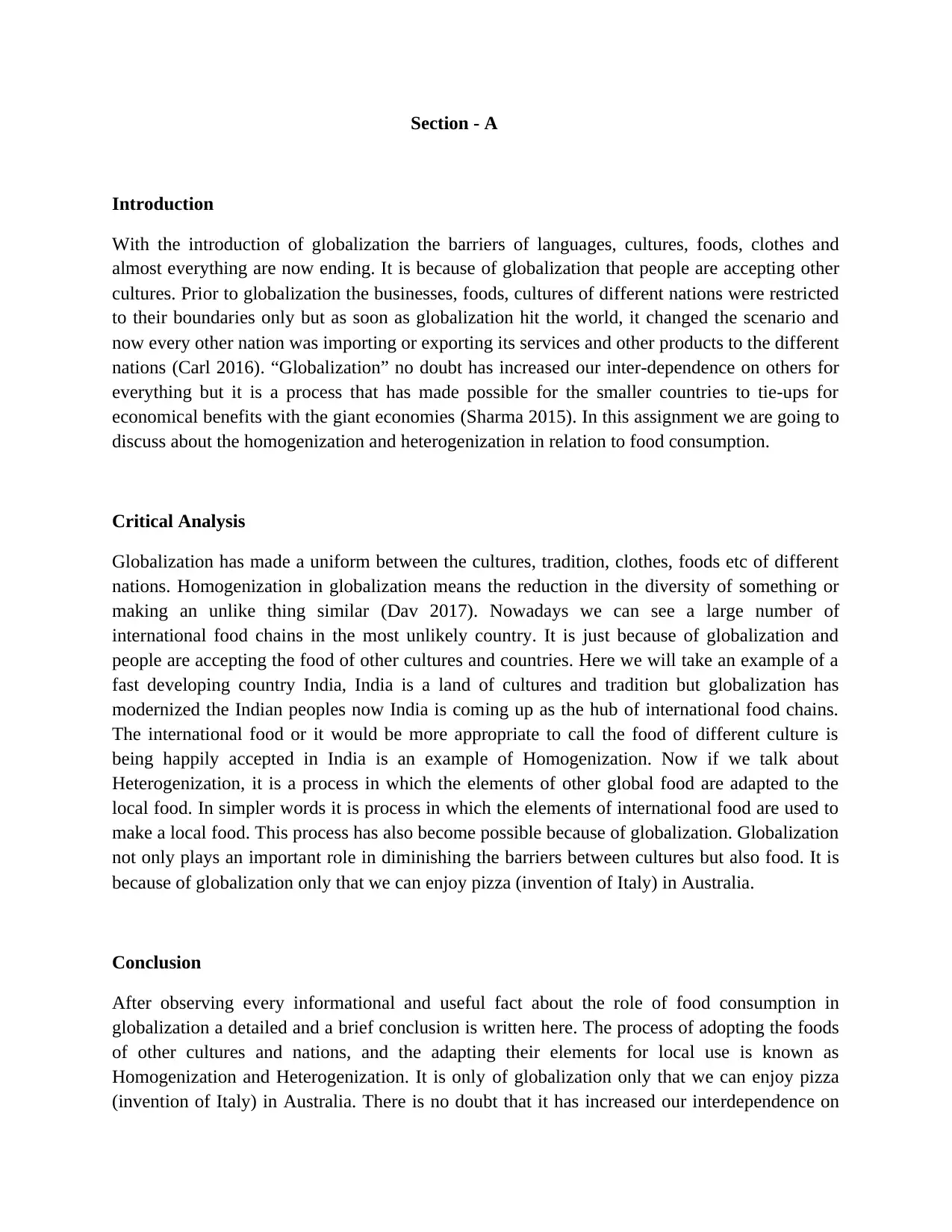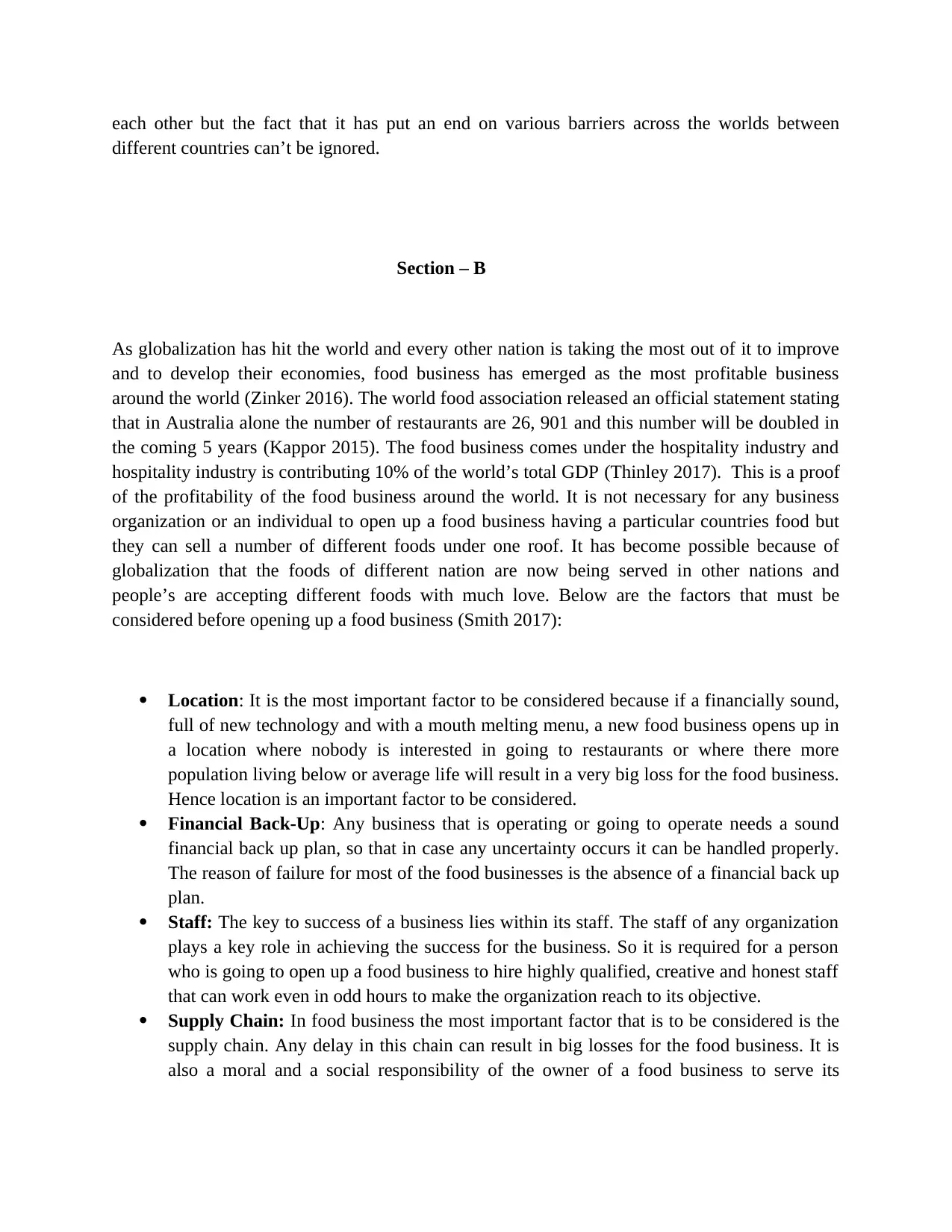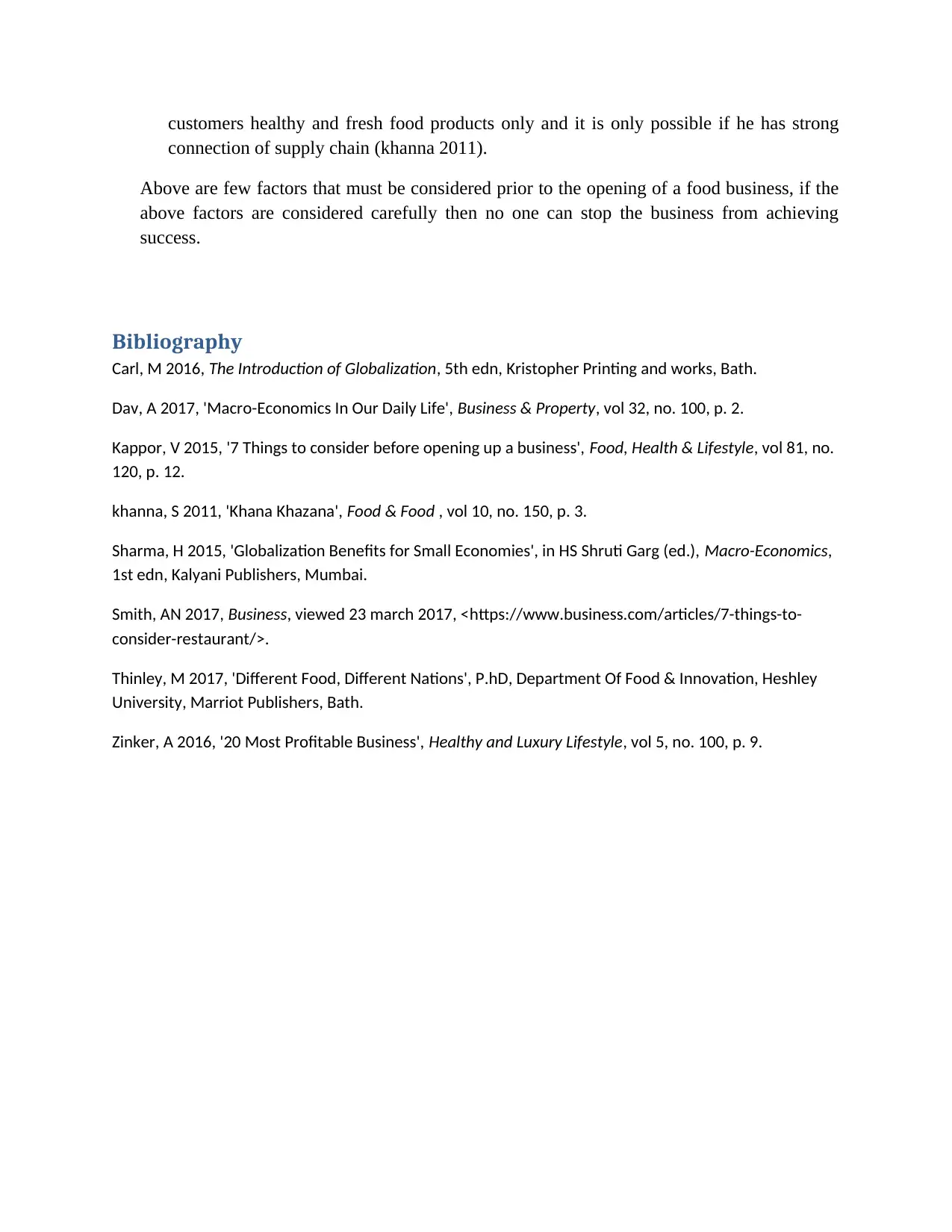Globalization's Effect on Food Consumption and Business
VerifiedAdded on 2019/11/08
|4
|1250
|206
Report
AI Summary
This report analyzes the impact of globalization on the food business, exploring the concepts of homogenization and heterogenization in food consumption. It examines how globalization has led to the acceptance of international food chains and the adaptation of global food elements into local cuisines. The report highlights the profitability of the food business, referencing statistics on restaurant growth and the hospitality industry's contribution to the global GDP. It also provides a detailed discussion of essential factors to consider when opening a food business, including location, financial backing, staff, and supply chain management. The conclusion emphasizes the role of globalization in breaking down barriers between countries and facilitating the exchange of food cultures.

Name:
Student Number:
Resident Campus:
Assessment Title:
Lecturer Name:
Submitted On:
Sources:
Student Number:
Resident Campus:
Assessment Title:
Lecturer Name:
Submitted On:
Sources:
Paraphrase This Document
Need a fresh take? Get an instant paraphrase of this document with our AI Paraphraser

Section - A
Introduction
With the introduction of globalization the barriers of languages, cultures, foods, clothes and
almost everything are now ending. It is because of globalization that people are accepting other
cultures. Prior to globalization the businesses, foods, cultures of different nations were restricted
to their boundaries only but as soon as globalization hit the world, it changed the scenario and
now every other nation was importing or exporting its services and other products to the different
nations (Carl 2016). “Globalization” no doubt has increased our inter-dependence on others for
everything but it is a process that has made possible for the smaller countries to tie-ups for
economical benefits with the giant economies (Sharma 2015). In this assignment we are going to
discuss about the homogenization and heterogenization in relation to food consumption.
Critical Analysis
Globalization has made a uniform between the cultures, tradition, clothes, foods etc of different
nations. Homogenization in globalization means the reduction in the diversity of something or
making an unlike thing similar (Dav 2017). Nowadays we can see a large number of
international food chains in the most unlikely country. It is just because of globalization and
people are accepting the food of other cultures and countries. Here we will take an example of a
fast developing country India, India is a land of cultures and tradition but globalization has
modernized the Indian peoples now India is coming up as the hub of international food chains.
The international food or it would be more appropriate to call the food of different culture is
being happily accepted in India is an example of Homogenization. Now if we talk about
Heterogenization, it is a process in which the elements of other global food are adapted to the
local food. In simpler words it is process in which the elements of international food are used to
make a local food. This process has also become possible because of globalization. Globalization
not only plays an important role in diminishing the barriers between cultures but also food. It is
because of globalization only that we can enjoy pizza (invention of Italy) in Australia.
Conclusion
After observing every informational and useful fact about the role of food consumption in
globalization a detailed and a brief conclusion is written here. The process of adopting the foods
of other cultures and nations, and the adapting their elements for local use is known as
Homogenization and Heterogenization. It is only of globalization only that we can enjoy pizza
(invention of Italy) in Australia. There is no doubt that it has increased our interdependence on
Introduction
With the introduction of globalization the barriers of languages, cultures, foods, clothes and
almost everything are now ending. It is because of globalization that people are accepting other
cultures. Prior to globalization the businesses, foods, cultures of different nations were restricted
to their boundaries only but as soon as globalization hit the world, it changed the scenario and
now every other nation was importing or exporting its services and other products to the different
nations (Carl 2016). “Globalization” no doubt has increased our inter-dependence on others for
everything but it is a process that has made possible for the smaller countries to tie-ups for
economical benefits with the giant economies (Sharma 2015). In this assignment we are going to
discuss about the homogenization and heterogenization in relation to food consumption.
Critical Analysis
Globalization has made a uniform between the cultures, tradition, clothes, foods etc of different
nations. Homogenization in globalization means the reduction in the diversity of something or
making an unlike thing similar (Dav 2017). Nowadays we can see a large number of
international food chains in the most unlikely country. It is just because of globalization and
people are accepting the food of other cultures and countries. Here we will take an example of a
fast developing country India, India is a land of cultures and tradition but globalization has
modernized the Indian peoples now India is coming up as the hub of international food chains.
The international food or it would be more appropriate to call the food of different culture is
being happily accepted in India is an example of Homogenization. Now if we talk about
Heterogenization, it is a process in which the elements of other global food are adapted to the
local food. In simpler words it is process in which the elements of international food are used to
make a local food. This process has also become possible because of globalization. Globalization
not only plays an important role in diminishing the barriers between cultures but also food. It is
because of globalization only that we can enjoy pizza (invention of Italy) in Australia.
Conclusion
After observing every informational and useful fact about the role of food consumption in
globalization a detailed and a brief conclusion is written here. The process of adopting the foods
of other cultures and nations, and the adapting their elements for local use is known as
Homogenization and Heterogenization. It is only of globalization only that we can enjoy pizza
(invention of Italy) in Australia. There is no doubt that it has increased our interdependence on

each other but the fact that it has put an end on various barriers across the worlds between
different countries can’t be ignored.
Section – B
As globalization has hit the world and every other nation is taking the most out of it to improve
and to develop their economies, food business has emerged as the most profitable business
around the world (Zinker 2016). The world food association released an official statement stating
that in Australia alone the number of restaurants are 26, 901 and this number will be doubled in
the coming 5 years (Kappor 2015). The food business comes under the hospitality industry and
hospitality industry is contributing 10% of the world’s total GDP (Thinley 2017). This is a proof
of the profitability of the food business around the world. It is not necessary for any business
organization or an individual to open up a food business having a particular countries food but
they can sell a number of different foods under one roof. It has become possible because of
globalization that the foods of different nation are now being served in other nations and
people’s are accepting different foods with much love. Below are the factors that must be
considered before opening up a food business (Smith 2017):
Location: It is the most important factor to be considered because if a financially sound,
full of new technology and with a mouth melting menu, a new food business opens up in
a location where nobody is interested in going to restaurants or where there more
population living below or average life will result in a very big loss for the food business.
Hence location is an important factor to be considered.
Financial Back-Up: Any business that is operating or going to operate needs a sound
financial back up plan, so that in case any uncertainty occurs it can be handled properly.
The reason of failure for most of the food businesses is the absence of a financial back up
plan.
Staff: The key to success of a business lies within its staff. The staff of any organization
plays a key role in achieving the success for the business. So it is required for a person
who is going to open up a food business to hire highly qualified, creative and honest staff
that can work even in odd hours to make the organization reach to its objective.
Supply Chain: In food business the most important factor that is to be considered is the
supply chain. Any delay in this chain can result in big losses for the food business. It is
also a moral and a social responsibility of the owner of a food business to serve its
different countries can’t be ignored.
Section – B
As globalization has hit the world and every other nation is taking the most out of it to improve
and to develop their economies, food business has emerged as the most profitable business
around the world (Zinker 2016). The world food association released an official statement stating
that in Australia alone the number of restaurants are 26, 901 and this number will be doubled in
the coming 5 years (Kappor 2015). The food business comes under the hospitality industry and
hospitality industry is contributing 10% of the world’s total GDP (Thinley 2017). This is a proof
of the profitability of the food business around the world. It is not necessary for any business
organization or an individual to open up a food business having a particular countries food but
they can sell a number of different foods under one roof. It has become possible because of
globalization that the foods of different nation are now being served in other nations and
people’s are accepting different foods with much love. Below are the factors that must be
considered before opening up a food business (Smith 2017):
Location: It is the most important factor to be considered because if a financially sound,
full of new technology and with a mouth melting menu, a new food business opens up in
a location where nobody is interested in going to restaurants or where there more
population living below or average life will result in a very big loss for the food business.
Hence location is an important factor to be considered.
Financial Back-Up: Any business that is operating or going to operate needs a sound
financial back up plan, so that in case any uncertainty occurs it can be handled properly.
The reason of failure for most of the food businesses is the absence of a financial back up
plan.
Staff: The key to success of a business lies within its staff. The staff of any organization
plays a key role in achieving the success for the business. So it is required for a person
who is going to open up a food business to hire highly qualified, creative and honest staff
that can work even in odd hours to make the organization reach to its objective.
Supply Chain: In food business the most important factor that is to be considered is the
supply chain. Any delay in this chain can result in big losses for the food business. It is
also a moral and a social responsibility of the owner of a food business to serve its
⊘ This is a preview!⊘
Do you want full access?
Subscribe today to unlock all pages.

Trusted by 1+ million students worldwide

customers healthy and fresh food products only and it is only possible if he has strong
connection of supply chain (khanna 2011).
Above are few factors that must be considered prior to the opening of a food business, if the
above factors are considered carefully then no one can stop the business from achieving
success.
Bibliography
Carl, M 2016, The Introduction of Globalization, 5th edn, Kristopher Printing and works, Bath.
Dav, A 2017, 'Macro-Economics In Our Daily Life', Business & Property, vol 32, no. 100, p. 2.
Kappor, V 2015, '7 Things to consider before opening up a business', Food, Health & Lifestyle, vol 81, no.
120, p. 12.
khanna, S 2011, 'Khana Khazana', Food & Food , vol 10, no. 150, p. 3.
Sharma, H 2015, 'Globalization Benefits for Small Economies', in HS Shruti Garg (ed.), Macro-Economics,
1st edn, Kalyani Publishers, Mumbai.
Smith, AN 2017, Business, viewed 23 march 2017, <https://www.business.com/articles/7-things-to-
consider-restaurant/>.
Thinley, M 2017, 'Different Food, Different Nations', P.hD, Department Of Food & Innovation, Heshley
University, Marriot Publishers, Bath.
Zinker, A 2016, '20 Most Profitable Business', Healthy and Luxury Lifestyle, vol 5, no. 100, p. 9.
connection of supply chain (khanna 2011).
Above are few factors that must be considered prior to the opening of a food business, if the
above factors are considered carefully then no one can stop the business from achieving
success.
Bibliography
Carl, M 2016, The Introduction of Globalization, 5th edn, Kristopher Printing and works, Bath.
Dav, A 2017, 'Macro-Economics In Our Daily Life', Business & Property, vol 32, no. 100, p. 2.
Kappor, V 2015, '7 Things to consider before opening up a business', Food, Health & Lifestyle, vol 81, no.
120, p. 12.
khanna, S 2011, 'Khana Khazana', Food & Food , vol 10, no. 150, p. 3.
Sharma, H 2015, 'Globalization Benefits for Small Economies', in HS Shruti Garg (ed.), Macro-Economics,
1st edn, Kalyani Publishers, Mumbai.
Smith, AN 2017, Business, viewed 23 march 2017, <https://www.business.com/articles/7-things-to-
consider-restaurant/>.
Thinley, M 2017, 'Different Food, Different Nations', P.hD, Department Of Food & Innovation, Heshley
University, Marriot Publishers, Bath.
Zinker, A 2016, '20 Most Profitable Business', Healthy and Luxury Lifestyle, vol 5, no. 100, p. 9.
1 out of 4
Related Documents
Your All-in-One AI-Powered Toolkit for Academic Success.
+13062052269
info@desklib.com
Available 24*7 on WhatsApp / Email
![[object Object]](/_next/static/media/star-bottom.7253800d.svg)
Unlock your academic potential
Copyright © 2020–2026 A2Z Services. All Rights Reserved. Developed and managed by ZUCOL.





